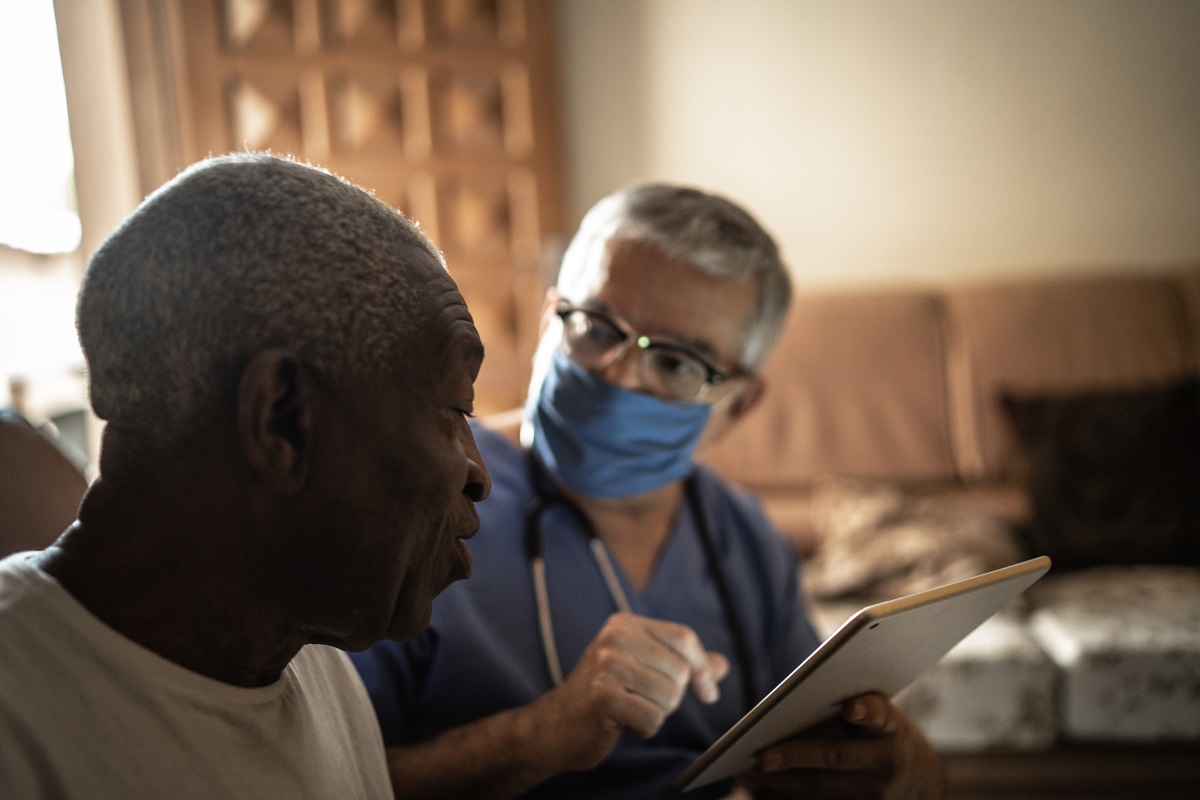
Supporting vulnerable residents and those who live with frailty throughout the COVID-19 winter.
In the South West region, the three AHSNs (West of England, South West and Wessex) are supporting ambitious plans to work together as an entire health and care system to make best use of available technologies to support our vulnerable residents during the winter months, in particular residents in care homes, those who live with frailty, and people with learning disabilities.
This work is led by NHSX, who have provided funding to each of the seven NHS England and NHS Improvement regions to form a regional collaborative to accelerate the implementation of remote monitoring technology to support people in their own home setting. Read more about this work across the country here.
The shared objective of our work in the South West is to improve outcomes for those most at risk, using technology as an enabler. While digital and remote monitoring technologies are vital elements in helping create further capacity in our systems, our partners across health and care are agreed that our approach is not simply a technology programme. It is an opportunity to use a ‘learning by doing’ transformative approach, which builds knowledge and skills to enable frontline teams to co-produce real and lasting improvements for our population.
What are we trying to achieve in the South West?
Initially our work in the South West will focus on care homes for older people and for people with learning disabilities, before progressing to domiciliary care settings and directly supporting individuals own their homes.
The three main strands of our work through to March 2021 are:
1. Improving remote monitoring of residents in care homes
We will support care homes to increase their use of remote monitoring technologies, building on the learning and developments seen during the pandemic to date, helping care homes to communicate and share information about patients more easily with other care providers, such as GPs, hospitals, community teams and pharmacists. This will lead to improvements in escalation planning and symptom management.
“If care home staff had a digital platform that would enable them to communicate more effectively with other members of the multidisciplinary team (such as pharmacists, palliative care nurses and GPs) then this would save time and improve quality of care.”
Sian Davies, Registered Nurse and the West of England AHSN’s Care Homes Digital Adviser
We will work closely with colleagues in our Patient Safety Collaborative who are providing support around COVID Oximetry at Home pathways.
“With the current challenges of the COVID pandemic, the ability to manage people remotely in care homes has become an essential tool in preventing any potential spread of infection. Remote monitoring technologies have the potential to give clinicians (including GPs, community staff and hospital consultants) an up-to-date, more complete picture of a resident’s health status, allowing better management and early detection of an acute illness. Use of these technologies can also promote more efficient proactive health care by directing health resources to the right individuals.”
Dr Shanil Mantri, GP and Clinical Digital Advisor to West of England AHSN
2. Providing better support for people with learning disabilities
We will support the use of remote monitoring and other digital capabilities to help people with learning disabilities manage their long-term conditions, such as diabetes, arthritis, heart or respiratory conditions.
We will also use innovative technologies to increase the uptake of annual health checks (digital tools can play an important role in recording remote observations, particularly for people less able to describe how they are feeling) and improve the quality of resulting health action plans.
We believe this will help to reduce health inequalities for people with learning disabilities, enabling them to instantly and remotely share their care needs without face-to-face contact with multiple care providers.
3. Supporting quicker, more effective clinical decision-making for the most vulnerable patients
With the needs of individual patients at the centre, we will progress our ambitions to collectively use secure clinical communication tools to share information with health and care staff across different organisations and multi-disciplinary teams. This will support interpretation of data coming in from remote monitoring tools, helping to ensure the right decisions are made about people’s care needs at the right time. We expect this to lead to a reduction in people needing to be admitted to emergency departments, an increase in virtual outpatient appointments, and time saving for our workforce, including care home staff – allowing them to spend more time on patient care.
Who is involved?
Our work in the South West region brings together health and care organisations (both NHS and non-NHS) across the entire geography: Devon, Cornwall, Somerset, North Somerset, Gloucestershire, South Gloucestershire, Bristol, Bath and North East Somerset, Swindon, Wiltshire and Dorset.
Our partners include the seven Sustainable Transformation Partnerships (STPs) and Integrated Care Systems (ICSs) in the South West, three Academic Health Science Networks (AHSNs) and the regional NHS England and NHS Improvement team.
We will build on the great work we’ve already seen during the response to the pandemic and other ongoing digital programmes, such as Joining up Care, NHS at Home, Digital First Primary Care, and the developing One South West Local Health and Care Record (LHCR).
Five questions to help you select the right digital solutions for remote monitoring during COVID-19
For advice on what to think about when selecting the right digital solutions for remote monitoring, read this new blog post from Dr Shanil Mantri, GP and Clinical Digital Advisor to the West of England AHSN.
Posted on November 12, 2020


